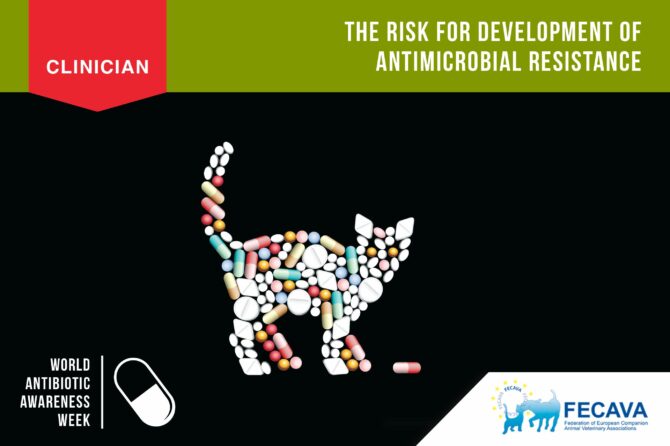
World Antimicrobial Awareness Week
On the European Antibiotic Awareness Day and World Antimicrobial Awareness Week (18 – 24 November), we collected a few short reminders important in veterinary medicine to fight against antimicrobial resistance. It’s a constant fight with many stakeholders involved – including you!
#KeepAntibioticsWorking #WorldAntibioticAwarenessWeek #OneHealth
- Any use of antimicrobials can result in the development of antimicrobial resistance. The risk increases if the antimicrobials are used inappropriately:
• use on non-susceptible microorganisms
• at sub-therapeutic doses
• repeatedly
• for inappropriate periods of time. - The ultimate objective is to prevent the disease instead of treating it with antimicrobials for example:
• with regular vaccinations
• high hygiene standards when handling the animals
• using aseptic techniques in surgery.
Download our Guidelines on Hygiene and Infection Control in Veterinary Practice. - Where it’s necessary to prescribe an antimicrobial, the prescription should be based on a diagnosis made following the clinical examination of the animal.
- Where possible, antimicrobial susceptibility testing should be carried out to determine the choice of antimicrobial.
- A narrow-spectrum antimicrobial should always be the first choice and the use of broad-spectrum antimicrobial and antimicrobial combinations should be avoided.
- The use of critically important antimicrobials (CIAs) for human medicine should be limited to cases where no other alternative is available. This includes fluoroquinolones (e.g. enrofloxacin, marbofloxacin) and 3rd and 4th generation cephalosporins.
Those CIAs that do not have marketing authorization as veterinary medicinal products may be used off-label (cascade) in pet animals but strictly limited to very exceptional cases e.g. where there are ethical reasons for doing so, and only when laboratory antimicrobial susceptibility tests have confirmed that no other antimicrobial would be effective.
WHO paper on Critically Important Antimicrobials for Human Medicine
EMA Infographics Categorisation of antibiotics for use in animals for prudent and responsible - When clinical infection with methicillin-resistant Staphilococcus aureus (MRSA) or methicillin-resistant Staphylococcus pseudointermedius (MRSP) is suspected or detected it is very important that the risk of infection spreading in an animal hospital and veterinary clinics are minimized. Quarantine should be considered.
Leave a reply

Leave a reply